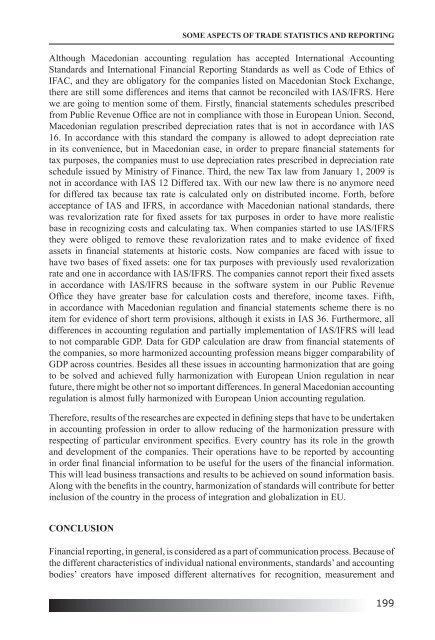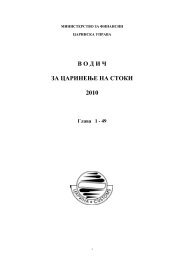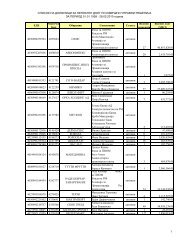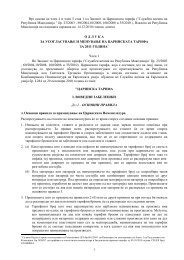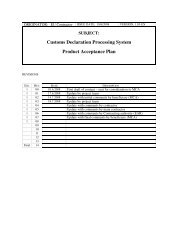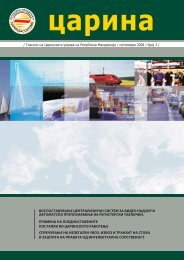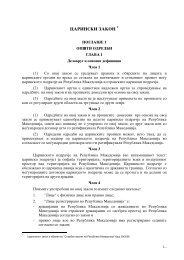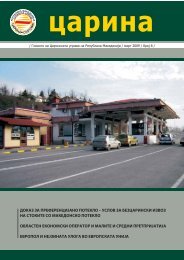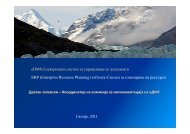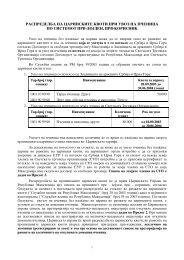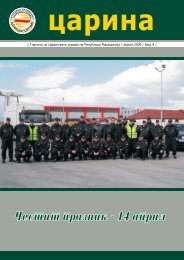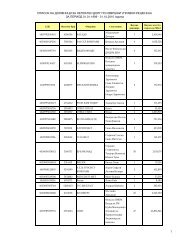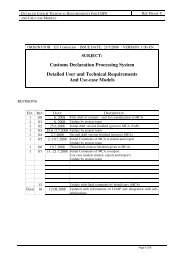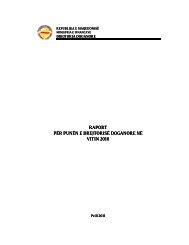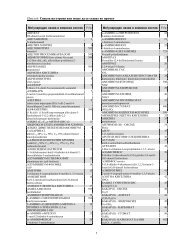REGIONAL COOPERATION AND ECONOMIC INTEGRATION
REGIONAL COOPERATION AND ECONOMIC INTEGRATION
REGIONAL COOPERATION AND ECONOMIC INTEGRATION
- No tags were found...
You also want an ePaper? Increase the reach of your titles
YUMPU automatically turns print PDFs into web optimized ePapers that Google loves.
SOME ASPECTS OF TRADE STATISTICS <strong>AND</strong> REPORTING<br />
Although Macedonian accounting regulation has accepted International Accounting<br />
Standards and International Financial Reporting Standards as well as Code of Ethics of<br />
IFAC, and they are obligatory for the companies listed on Macedonian Stock Exchange,<br />
there are still some differences and items that cannot be reconciled with IAS/IFRS. Here<br />
we are going to mention some of them. Firstly, financial statements schedules prescribed<br />
from Public Revenue Office are not in compliance with those in European Union. Second,<br />
Macedonian regulation prescribed depreciation rates that is not in accordance with IAS<br />
16. In accordance with this standard the company is allowed to adopt depreciation rate<br />
in its convenience, but in Macedonian case, in order to prepare financial statements for<br />
tax purposes, the companies must to use depreciation rates prescribed in depreciation rate<br />
schedule issued by Ministry of Finance. Third, the new Tax law from January 1, 2009 is<br />
not in accordance with IAS 12 Differed tax. With our new law there is no anymore need<br />
for differed tax because tax rate is calculated only on distributed income. Forth, before<br />
acceptance of IAS and IFRS, in accordance with Macedonian national standards, there<br />
was revalorization rate for fixed assets for tax purposes in order to have more realistic<br />
base in recognizing costs and calculating tax. When companies started to use IAS/IFRS<br />
they were obliged to remove these revalorization rates and to make evidence of fixed<br />
assets in financial statements at historic costs. Now companies are faced with issue to<br />
have two bases of fixed assets: one for tax purposes with previously used revalorization<br />
rate and one in accordance with IAS/IFRS. The companies cannot report their fixed assets<br />
in accordance with IAS/IFRS because in the software system in our Public Revenue<br />
Office they have greater base for calculation costs and therefore, income taxes. Fifth,<br />
in accordance with Macedonian regulation and financial statements scheme there is no<br />
item for evidence of short term provisions, although it exists in IAS 36. Furthermore, all<br />
differences in accounting regulation and partially implementation of IAS/IFRS will lead<br />
to not comparable GDP. Data for GDP calculation are draw from financial statements of<br />
the companies, so more harmonized accounting profession means bigger comparability of<br />
GDP across countries. Besides all these issues in accounting harmonization that are going<br />
to be solved and achieved fully harmonization with European Union regulation in near<br />
future, there might be other not so important differences. In general Macedonian accounting<br />
regulation is almost fully harmonized with European Union accounting regulation.<br />
Therefore, results of the researches are expected in defining steps that have to be undertaken<br />
in accounting profession in order to allow reducing of the harmonization pressure with<br />
respecting of particular environment specifics. Every country has its role in the growth<br />
and development of the companies. Their operations have to be reported by accounting<br />
in order final financial information to be useful for the users of the financial information.<br />
This will lead business transactions and results to be achieved on sound information basis.<br />
Along with the benefits in the country, harmonization of standards will contribute for better<br />
inclusion of the country in the process of integration and globalization in EU.<br />
CONCLUSION<br />
Financial reporting, in general, is considered as a part of communication process. Because of<br />
the different characteristics of individual national environments, standards’ and accounting<br />
bodies’ creators have imposed different alternatives for recognition, measurement and<br />
199


